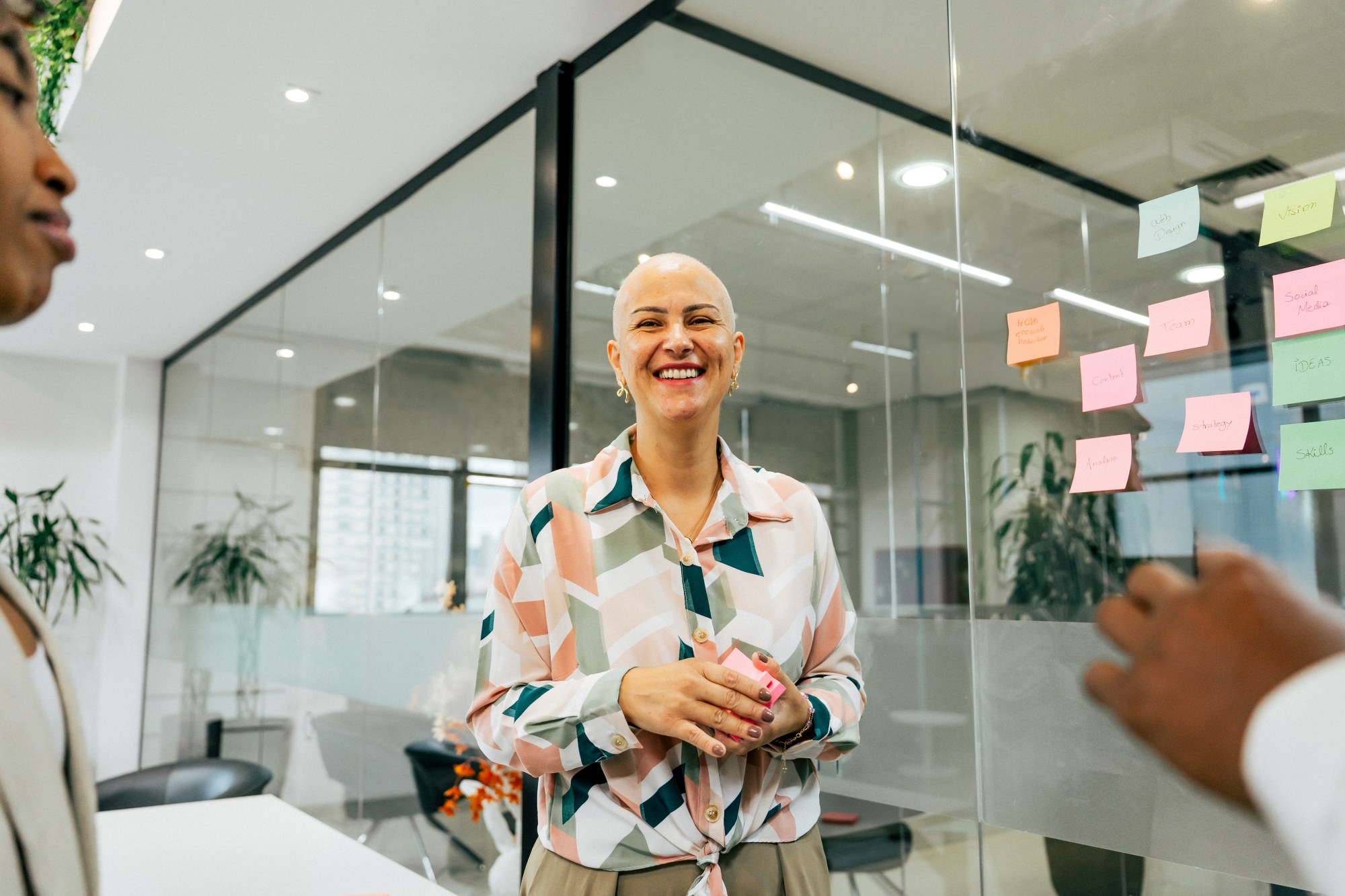After cancer, the road to recovery is complex and varied. To truly heal, survivors need support that’s as dynamic and multidimensional they are.
Denise was 53 the first time she was diagnosed with breast cancer. She knew, from the minute she concluded treatment, that there would be a second time. So when something showed up on a routine mammogram five years later, she wasn’t surprised. She wasn’t scared. Oddly, she was calm. Her anxiety was proven right—it had done its duty—so now it left her be.
Her treatment went relatively smoothly: a lumpectomy followed by several weeks of radiation. It wasn’t until after, when she was once again told she was “all clear,” that the dread, fear, and uncertainty finally set in. What now?
The fear of recurrence hit immediately. It had already happened once—why not again? Could she ever feel confident that her cancer journey was, once and for all, truly over?
Concerns about her overall health loomed just as large. I’m nearly 60 years old, she thought. Will my body ever fully recover from the effects of treatment? Will I feel this exhausted forever?
And what about my job? she thought. What if I can’t get back to my previous level of performance? What if they let me go? I’m not young anymore, I can’t just pivot. It might take months to find something new. I can’t afford that kind of downtime.
And finally: Is this what the rest of my life will be like? Feeling scared and hopeless?
It’s spirals like these that underscore the need for holistic, human-centered support.
Filling the Gaps: An Innovative Approach to Cancer Support
Each year, over 20 million people hear the life-altering words, “You have cancer.” And each year, as many as two in three will return to work.
As cancer becomes more prevalent—and as survivor advocacy grows—more organizations are looking to deliver targeted support for employees impacted by cancer.
The problem, however, is that most services today still focus primarily on physical or occupational rehabilitation—often operating under fragmented or siloed models. What survivors need instead is personalized, wraparound care that addresses not just physical or vocational recovery, but emotional, existential, and psychosocial wellbeing—and that does so all at once.
Enter Return to Work: Cancer Care Compass, a human-centered, clinically guided program from Workplace Options (WPO) that supports every stage of the cancer journey. Grounded in the LLSW model—Learning, Living, Social, Working—the program empowers individuals to reclaim not just their health, but their identity, purpose, and future.
At the heart of the program is what makes it truly unique: the Cancer Care Coordinator—a single, clinically trained professional who walks alongside each employee throughout their journey, building trust, ensuring continuity, and delivering a personalized care experience that adapts to the real-life needs of every individual.
Trained by world-leading experts in oncology and psychiatric rehabilitation, each coordinator is uniquely positioned to deliver care that is clinically sound, emotionally attuned, and vocationally empowering. By going beyond symptom management and professional re-entry to provide identity-centered support that addresses employees’ emotional, psychosocial, and existential concerns, the coordinators enable individuals not only to resume but reconnect with their lives—helping them move toward a full, lasting recovery, in every sense of the word.
“Recovery isn’t just about physical healing. It’s about finding your footing in a changed world—as a profoundly changed individual,” says Sarah Wood, VP and General Manager of Emerging Solutions at WPO. “Our Cancer Care Coordinators are there to walk alongside each individual, offering not just clinical guidance but deep, human support that helps survivors reconnect with who they are and what they value most.”
One Disease, Many Journeys: Refashioning Support to the Individual
No two cancer journeys are the same. Support plans shouldn’t be either.
For survivors like Denise—those beyond what’s often considered the “prime” of their careers, and for whom the future or a sense of possibility can already feel elusive—the support they need looks markedly different from that of someone just entering adulthood or the workforce.
For survivors in their 20s and 30s, post-treatment concerns often center around regaining momentum: “catching up” with their peers, getting back on track in their careers, planning for a family, and building financial security.
In contrast, survivors in midlife often face more layered and complex challenges: concerns about returning to or maintaining their professional roles, balancing work and caregiving responsibilities, preserving their own wellbeing, and managing long-term effects of treatment often compounded by the realities of aging.
Fears of recurrence, too, can manifest differently. Depending on the type of cancer and other individual risk factors, this fear may be more pronounced for some. Meanwhile, lasting physical changes from surgery or more intensive treatment may heighten concerns around body image, self-esteem, confidence, and perceived capability for others.
All this underscores a simple truth: healing isn’t uniform. There is no one, true path to recovery—and as such, there is no one, definitive support plan to follow. Survivors need care that is as adaptive as they are dynamic, as holistic as they are human. In receiving that level of comprehensive support from one provider throughout their journey, individuals gain the confidence and clarity they need to navigate the unique challenges they face and re-engage with life with a restored sense of identity, purpose, and determination.
Countering Uncertainty Through Continuity: The Stabilizing Force of Singular Support
Yet while recovery looks different for everyone, there are, of course, plenty of ties that bind. A deep sense of disconnection is one of them.
Though the causes vary, many survivors carry with them a profound sense of detachment after treatment. Whether they are tangibly alone—no longer having a care team checking in, without any family or friends to lean on; or feel isolated in their experience—unable to relate to others; or perhaps no longer feel tied to a deeper purpose, the underlying feeling is the same: unmoored.
What helps to re-anchor survivors is continuity. By receiving support from a single, dedicated professional throughout their cancer journey—from diagnosis all the way through reintegration—survivors are able to build and maintain a deep sense of connection over time. In this way, the Cancer Care Coordinator becomes a stabilizing presence—grounding survivors throughout the highs and lows of treatment and recovery, and placing them on a clearer, more confident path back to their lives—and to themselves.
“So many survivors report feeling lost after treatment—not just physically drained, but emotionally untethered,” says Wood. “The Cancer Care Coordinator provides a steady hand during one of life’s most uncertain moments. That continuity can be the difference between merely surviving and truly thriving.”
Recovery Reimagined
The mark cancer leaves on survivors is indelible—but it doesn’t have to be defining.
Programs like Return to Work: Cancer Care Compass mark a pivotal milestone in workplace cancer support—uniting clinical expertise with connection, continuity, and compassion to deliver truly comprehensive care to those impacted by cancer.
By investing in holistic, human-centered support, employers can help ensure that cancer doesn’t define an employee’s future, but instead becomes a springboard toward renewed purpose and possibility.
To learn more about how WPO can support employees impacted by cancer—and how the Return to Work: Cancer Care Compass program supports every step of the cancer journey—connect with us today or visit https://www.workplaceoptions.com/wellbeing_solutions/cancer-care-compass/ for more information.
Disclaimer: Some details in this article have been fictionalized.





































